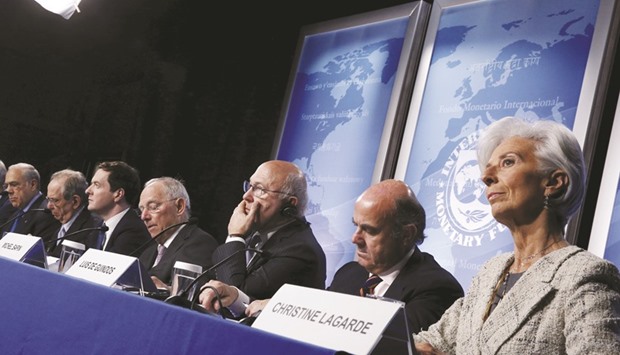Financial leaders from the Group of 20 major economies scrambled yesterday for a way to keep global growth from stalling amid concerns about a drop-off in international trade and the waning effectiveness of loose monetary policy.
The G20 gathering, the highlight of the International Monetary Fund and World Bank spring meetings in Washington, came amid growing pressure on richer nations to boost infrastructure spending, deregulate industries and spur employment.
Earlier this week the IMF cut its 2016 growth forecast for the world economy, the fourth such move in less than a year.
In a statement to the G20 on Thursday night, Indian Finance Minister Arun Jaitley said governments could not continue relying on central banks to take the lead in spurring growth and should consider boosting spending.
“We feel that the efficacy of monetary policy instruments has reached its limits and that its pass-through has not been seamless,” Jaitley said. “The time is ripe for a re-evaluation of the fiscal policy space, with a greater focus placed on public investment.”
Although India is one of the brightest stars of the world economy, with the IMF predicting 7.5% growth this year, Jaitley warned that the global recovery was fragile and could easily be derailed by weak demand, tighter financial markets, softening trade and volatile capital flows.
“We, therefore, need to articulate an effective and tangible policy response to revive the trade engine of the global economy. Countries must avoid trade protectionist measures, and refrain from competitive devaluations,” he said.
But Jaitley’s currency views appeared at odds with those of Japanese officials, who expressed concerns about increases in the value of the yen, which recently hit a 17-month high against the dollar. Japanese Finance Minister Taro Aso told reporters late on Thursday that he stressed those concerns in a meeting with US Treasury Secretary Jack Lew, a sign that currency issues would be high on the list of the G20’s priorities.
“I told (Lew) that excessive volatility and disorderly currency moves would have a negative impact on the economy. I also expressed deep concern over recent one-sided moves in the currency market,” Aso said.
Meanwhile, the world’s leading economies yesterday embraced a new crackdown on tax havens and the use of shell companies to hide money, as the Panama Papers scandal claimed another victim. A draft communique from the G20 finance ministers meeting in Washington endorsed a plan that would rip away the shield of secrecy for companies and individuals stocking assets offshore behind anonymous companies, a dramatic move that could put a deep dent in tax evasion, money laundering and illicit finance.
Making the beneficial owners of companies, trusts and foundations transparent “is vital to protect the integrity of the international financial system,” the draft G20 communique said.
The move came as Spain’s industry minister Jose Manuel Soria resigned over allegations he had links to offshore companies.
Files from the leaked document trove of Panama law firm Mossack Fonseca showed Soria was an administrator of an offshore firm in 1992. He was just the latest in a number of powerful officials, including the leaders of Russia, Iceland, Britain and Argentina, linked by the Panama Papers to offshore tax havens.
Soria stepped down admitting “mistakes” in explaining his alleged offshore interests and “the obvious harm that this situation is doing to the Spanish government,” which is one of the five European powers behind the new proposal to end anonymity for the beneficial owners of shell companies.

From left: OECD secretary general Jose Angel Gurria, Italy’s Finance Minister Pier Carlo Padoan, Britain’s Chancellor of the Exchequer George Osborne, Germany’s Finance Minister Wolfgang Schaeuble, France’s Finance Minister Michel Sapin, Spain’s Finance Minister Luis de Guindos and International Monetary Fund managing director Christine Lagarde hold a news conference at the IMF-World Bank Spring Meetings in Washington yesterday.
